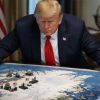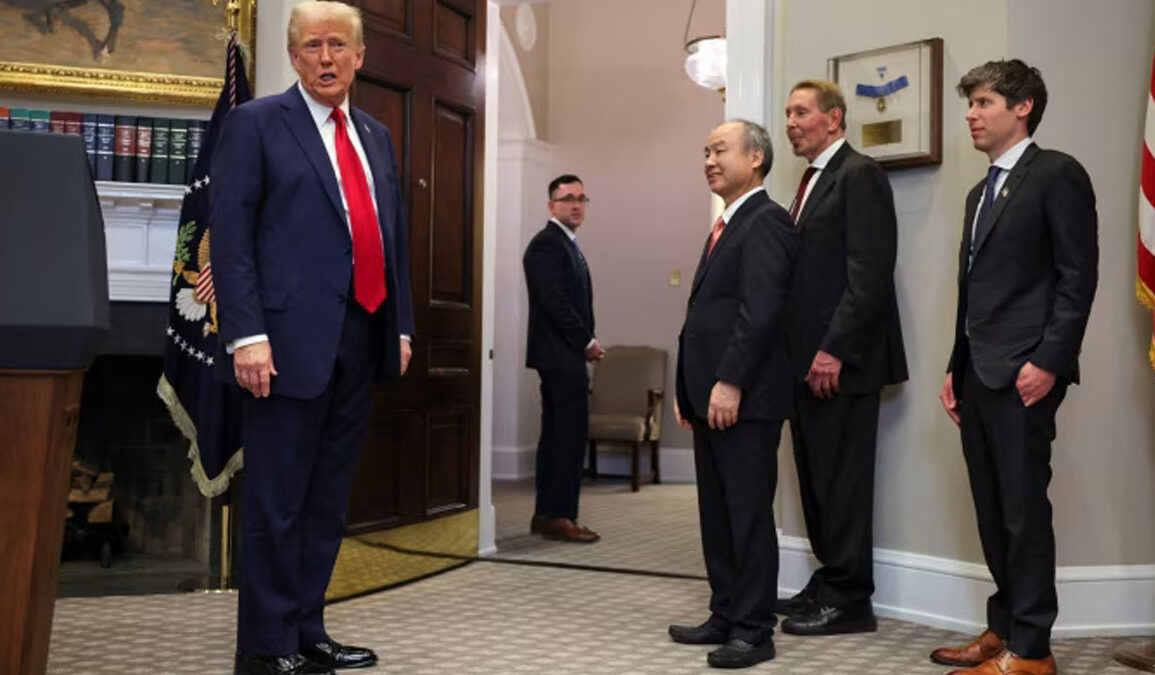In a landmark announcement today, former President Donald Trump unveiled a bold initiative to solidify America’s leadership in artificial intelligence (AI). A collaborative venture, known as Stargate, will see a staggering investment of up to $500 billion from major players OpenAI, SoftBank, and Oracle. This initiative aims to establish the infrastructure needed to fuel the next wave of AI advancements, positioning the U.S. as a formidable force in the global AI race and countering China’s aggressive strategies in the sector.
Calling it the “largest AI infrastructure project in history,” Trump emphasized the transformative impact this initiative could have on both the economy and national security. Speaking from the White House, he stated, “China is a competitor, others are competitors. We want to lead here in America. Through emergency declarations, we’ll ensure this gets built because we can’t afford to fall behind.”
The Role of AI in U.S.-China Competition
The race for AI dominance is a defining feature of U.S.-China relations, intertwining economic ambitions with national security concerns. Both nations recognize AI as a transformative technology with far-reaching implications. While the U.S. continues to lead in frontier AI developments, such as generative models and advanced semiconductor technologies, China has rapidly closed the gap through state-sponsored initiatives and questionable practices, including intellectual property theft.
China’s advancements in AI have been driven by vast investments in research and development, as well as its ability to leverage a massive workforce and state-backed infrastructure. However, much of its progress has been marred by accusations of unethical practices, such as espionage and exploiting regulatory loopholes to access restricted technologies. These actions underscore the urgent need for the U.S. to strengthen its AI ecosystem and maintain its competitive edge.
How China Gained an Advantage
China’s AI progress has often come at the expense of legal and ethical boundaries. Key strategies include espionage, exploiting loopholes, and leveraging state resources to accelerate development. Chinese hackers have targeted American tech firms to steal sensitive data, while companies like ByteDance have reportedly circumvented export controls by accessing restricted technologies through foreign cloud services.
In one striking example, Huawei was found smuggling components to produce its Ascend 910 AI chips, designed to rival Nvidia’s offerings. Despite these efforts, many of China’s achievements rely heavily on adapting and replicating existing technologies developed by U.S. companies. As Sam Altman, CEO of OpenAI, remarked during the Stargate announcement, “Infrastructure in the United States is super important. AI requires massive amounts of infrastructure, power, computer chips, and data centers, and we need to build that here.”
Trump’s Plan for AI Leadership
The Stargate initiative represents a pivotal moment in America’s AI strategy. By bringing together OpenAI, Oracle, and SoftBank, the project aims to construct a nationwide network of AI data centers, starting with Texas. Oracle’s Larry Ellison revealed that 10 data centers are already under construction in Texas, with more planned to follow. These facilities will provide the computational power needed to train and deploy advanced AI models, securing America’s position as a global leader in this critical field.
Sam Altman called Stargate “the most important project of this era,” citing its potential to revolutionize industries such as healthcare. He also praised Trump’s leadership, saying, “We wouldn’t be able to do this without you, Mr. President.” SoftBank CEO Masayoshi Son highlighted the initiative’s economic significance, describing it as essential for maintaining the U.S.’s competitive edge.
The High Stakes of the AI Race
Artificial intelligence is more than a driver of technological innovation; it is a strategic asset with profound implications for national security and global influence. From autonomous military systems to predictive intelligence tools, the country that leads in AI will hold unparalleled sway in shaping the future. Trump’s initiative is designed to ensure that the U.S. remains at the forefront of this rapidly evolving field.
China’s ambitions extend beyond technological advancements to embedding authoritarian values in the global digital landscape. By exporting AI-driven surveillance tools and offering state-backed solutions to developing nations, China aims to expand its influence and challenge democratic ideals. The Stargate project is America’s answer to these challenges, signaling its commitment to innovation, transparency, and maintaining leadership in the digital age.
Trump’s Role as a Champion of Innovation
President Trump’s announcement of the Stargate initiative underscores his commitment to ensuring America’s dominance in AI. By fostering partnerships with leading private-sector players and declaring AI infrastructure a national emergency, Trump has positioned the U.S. to outpace its competitors. His decisive actions highlight the importance of innovation, job creation, and strategic planning in securing the nation’s technological future.
The $500 billion Stargate project is not just an investment in infrastructure; it is a declaration of intent. It signals that the U.S. is ready to meet the challenges posed by China’s rapid advancements and unethical practices. As Larry Ellison aptly put it, “AI holds incredible promise for all of us, for every American.” With Stargate, the U.S. has taken a significant step forward in the race for AI supremacy, ensuring that its leadership remains unchallenged in the years to come.








